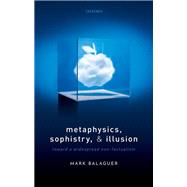Metaphysics, Sophistry, and Illusion Toward a Widespread Non-Factualism
, by Balaguer, Mark- ISBN: 9780198868361 | 0198868367
- Cover: Hardcover
- Copyright: 3/26/2021
Metaphysics, Sophistry, and Illusion does two things. First, it introduces a novel kind of non-factualist view, and argues that we should endorse views of this kind in connection with a wide class of metaphysical questions, most notably, the abstract-object question and the composite-object question. (More specifically, Mark Balaguer argues that there's no fact of the matter whether there are any such things as abstract objects or composite objects--or material objects of any other kind.) Second, Metaphysics, Sophistry, and Illusion explains how these non-factualist views fit into a general anti-metaphysical view called neo-positivism, and explains how we could argue that neo-positivism is true. Neo-positivism is the view that every metaphysical question decomposes into some subquestions--call them Q1, Q2, Q3, etc.--such that, for each of these subquestions, one of the following three anti-metaphysical views is true of it: non-factualism, or scientism, or metaphysically innocent modal-truth-ism. These three views can be defined (very roughly) as follows: non-factualism about a question Q is the view that there's no fact of the matter about the answer to Q. Scientism about Q is the view that Q is an ordinary empirical-scientific question about some contingent aspect of physical reality, and Q can't be settled with an a priori philosophical argument. And metaphysically innocent modal-truth-ism about Q is the view that Q asks about the truth value of a modal sentence that's metaphysically innocent in the sense that it doesn't say anything about reality and, if it's true, isn't made true by reality







